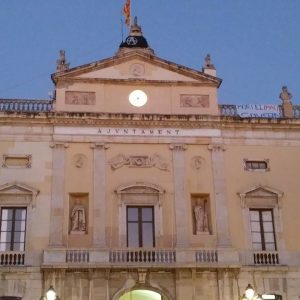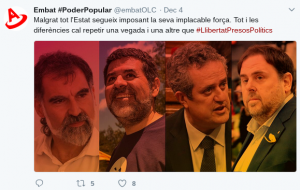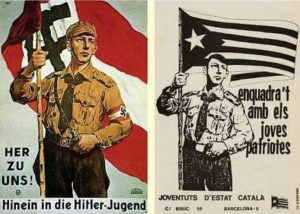What’s most prominent about the situation in Catalonia during the past few years has not been the permanent mobilization, the number of people that have participated in it, or the content of the reclamations. What calls the attention most is the absence of an unmistaken contestation of the Procés which doesn’t come from spanish nationalist positions, in a game of mirrors between reactionary images. The firm oppositions to the catalan nationalist movement, coming from socially critical and revolutionary positions, could be counted on the fingers of a hand, always limited to the taking of positions by isolated comrades.
We could very well say that the Tsunami has affected above all the ranks of those who should have opposed it unmistakably. What remains from all of this is a desolating panorama and one more demonstration of the insubstantial and empty character of social critique today.
Paul Valéry said that everything has already been said but the people are so hard of hearing that it must be repeated again. It’s not pleasant to recall truisms.
The so-called catalan conflict has its origin in the disputes between the oligarchs and the bourgeoisies of Barcelona and Madrid. Or really, in how surplus value and profits are distributed among these mafia groups in a period of scarce resources and of a profound crisis and transformation of global capitalism.
The method of appealing to the sentiments of national identity is the sure way to guarantee the support from important social sectors and the absolute control of the whole movement. Those are the rules of the game, and the most effective antidote for exorcising that which these people truly fear the most: the class struggle. For so many anarchist groups and self-proclaimed libertarians it should be enough to see how this same bourgeoisie acts when those from below dare to question the social relations: blood, fire and shrapnel. To think about being on the same side as these rogues should be a cause for thought for our “antisistemas”, but such an elemental truth continues to play hide-and-seek with them.

A banner-drop action by a “libertarian youth” group at the city hall of Tarragona at the time of the catalan referendum and Unilateral Declaration of Independence (2017). The banner reads “Death to (mis)government”(!)
One must have a strong stomach to not feel nauseous seeing Fernández (of a certain CUP)[TN1] hugging Artur Mas, an icon of the most reactionary and corrupt of the catalan oligarchy. Lacking accessory, meaning to the repressive and anti-worker politics of Mas, what unites both in representation of their respective sides is one same Homeland. Such is the world of the “antisistemas”.
The catalan bourgeoisie has leaned on the so-called middle classes (state employees, professionals from the “advanced” sectors, the academic intelligentsia, students, etc.) who are hit by the crisis and easily susceptible to being converted into an amorphous mass. They are the useful idiots of the capitalist society, the layers which naturally absorb all the ideology of the system, with its rituals to productivity, innovation, modernization and its technological china shop.
That all these people feel concerned and live their nationalist dedication with passion doesn’t remove the reason for the whole mobilization being organized, orchestrated and executed from above. And at the blow of a whistle.
It’s not a rank-and-file movement, where the self-organization and the creation of a program of action, although it was with weaknesses, had arisen from a profound social fabric. Those who are at the seat of command have utilized what turns out to be inherent to their nature and in consonance with their reactionary objectives: the portion of the state apparatus that they control. It is stemming from the Govern, with its Consellerias, the public mediums of communication and those which they subsidize, the universities, and even with the acquiescence of the forces of repression, how the Procés was drawn up.
The organizations of civil society like that of ómnium and the Catalan National Assembly (ANC) are satellites linked to the initiative of the State apparatus, although Ómnium comes from a long trajectory, and has gone on to fatten in the shadow on the general budget of the Generalitat. The “rank-and-file” organisms themselves, such as the Committees for the Defense of the Republic (CDR) or the more recent “Tsunami Democratic” manage some organizational and technological resources far above the means of what is habitual in these kinds of movements, simultaneously linking their actions with the institutional apparatus of the State.
If all of that wasn’t telling enough, wide sectors of employers are the fiercest of fighters for the cause. The movement is markedly interclassist. In the demonstrations the president of the employers’ association of the health sector[TN2] (the same one who, in the government of Artur Mas, tried to destroy the public health system for his own benefit) marches together with health workers, and the owner of the largest catalan multinational (of “Forward, have no fear President”)[TN3] along with his workers, in precarity and pushed to exhaustion.

A twitter post from the “anarcho-communist” platformist organization EMBAT, in support of imprisoned bourgeois nationalist leaders. The text reads “In spite of everything the State continues to impose its implacable force. Differences aside, we must repeat #FreeImprisonedPoliticians over and over again”
These are difficult times, times of forgetfulness. To behold a shapeless melee of people waving red and red&black flags marching together with their employers, sustaining a “national strike” subsidized by the State and the Employers, is a devastating spectacle. It even causes us to long for the dignity of the old reformists like August Bebel, who, when he was applauded by the conservative embankment in parliament, said to himself “What have you said, old Bebel”. Apparently our “Antisistemas” and Humanists don’t have that capacity for blushing.
We don’t bestow the State the right to destroy any single person. We detest the suffering inflicted on individuals, the punitive sadism of the State, and much more so by means of jail sentences. Therefore we do not rejoice in the jailing of anyone. One of the tasks of a society based upon solidarity will be to abolish that mechanism of relation.
Exactly for that reason, in the moment of analyzing the incarceration of the independentist leaders the first thing that must be said is that before they were imprisoned they were jailers. The furious persecution against the youth who encircled the Parliament, and against a thousand conflicts that have appeared in these last few years, indicates their social and -why not-, psychological nature. If anybody has any doubts its enough to consult the press and see what some of the imprisoned and their lawyers said about all these events.
Yet it must be recognized that they don’t fall into any contradiction: they are ready to use all the repressive power of the State apparatus in order to preserve this society. They say it actively and passively, what they want is to control that apparatus in its totality. To the extent in which they could in their governmental activity, they have oriented the patriotic police forces (the Mossos) towards that direction: prioritizing the containment of the social sectors that could put the social order into question, though in a limited form: anarchist groups, squats, associations in defense of living conditions, etc… Meaning, oriented towards social repression.
Even feeling empathy with their personal condition, it must be said clearly that these prisoners “Are not our prisoners”: because what they have done to us in the past, what they offer us presently and what they have reserved for us in the future is the same repression which they are victims of now.
Does anybody think that it’s a coincidence that the majority of the condemned nationalists attended homages to the Badia brothers[TN3]? Could there be a more explicit symbolic act? Having arrived to this point, we don’t want there to be any doubt:
We assert those who brought the Badias to justice.
Nationalism is reactionary and exclusionary, catalan nationalism no less than spanish nationalism, and it’s absolutely incompatible with a proposal for social transformation that respects equality and cultural differences without becoming state entities. What lurks in the shadows of the catalan nationalist movement, and many prominent leaders don’t hide it, is the destruction of a real multilingual and multicultural community. It’s good to warn of that now, before the “true” national markings are imposed with violent methods. It should surprise no one, in the end the catalan nationalist movement is a part of rise of nationalisms around the world, especially in Europe. It is with these, and not with the revolts of Chile, Lebanon, Haiti, Honduras, etc… that catalan nationalism is most closely related to. Giving it coherence in the entirety of the global situation.
Even when there are violent confrontations with the police, in some occasions the Mossos are considered “on our side”, they don’t contribute liberating perspectives. Contrary to the appreciation of many anarchist groups and persons of the libertarian world, we don’t consider fighting with the police a value in itself. What gives meaning to a confrontation with the repressive apparatus of the State is with what institutions it is desired to replace those that are fought against. It’s ridiculous to think that those who have propelled and directed the whole nationalist movement have even the slightest desire to give us something different than what already exists. Apart from, of course, a different flag.
The confrontation with the State is not purely an exercise of personal release, like that of one who goes to the gym.
It’s not necessary to jog the memory much to remember how numerous reactionary movements have fought against the police, even fiercely.
Following the saying of the revolutionaries who preceded us, that our own worst enemy is our own bourgeoisie, our opposition to catalan nationalism is frontal. And it is so for a matter of principles. The society that they propose to us is the same one that we’re in – and how could it be any different when they’re already the masters of what there is!
The tasks which we have before us have nothing to do with the construction of new Nation-States, this regressive atavism that the bourgeoisie and capital stir up in certain zones of the world is an expression of their profound social decadence.
There will be those who think in tacticisms, in not separating from the movement, in combating certain weaknesses and making an influence in certain sectors, in not throwing out the baby with the bathwater. Far from achieving results, what is accomplished is degrading the liberatory perspective, introducing concepts and practices which are a part of Capital as good ones. There’s no shortcuts. The only thing to do is to face the situation with honesty and clarity.
The only task which concerns us is that of fighting against this society of wage labor and the law of value, against the State and hierarchies, against the destruction of societies and of nature, against the ferocious repression of those that dare to respond, and against the mercantilization of all aspects of life.
Here and now, to put this perspective into motion, albeit modestly, it’s time to combat catalan nationalism without sidestepping.
Grupo Barbaria
November 18, 2019
Translator’s Notes:
1. David Fernandez is one of the leading politicians of the Popular Unity Candidature (CUP), an assembly-based social-democratic and catalan nationalist party which is considered in the sphere of bourgois politics to be “extreme-left” and “anti-system”, born out of the milieu of catalan left activist groups such as ARRAN and Envdavant and counting among its militants a whole spectrum of activists, from self-proclaimed anarchists to trotskyists.
2. Boi Ruiz was the Health Minister in the government of Artur Mas and general director of La Unió, the Association of Health and Social Entities, which was created in 1975 under the name Catalan-Balear Union of Hospitals.
3. Victor Grifols is the owner and chief of the multinational conglomerate Grifols, a manufacturer of blood-plasma derivatives which acquired the north american giant Talecris in 2011 and the blood transfusion diagnostic company Novartis in 2013. In April of 2014, on the occasion of an inaugural event for the opening of a new factory in the catalan town of Parets del Vallès, he used the opportunity to encourage the then-president of the catalan regional government Artur Mas to continue pushing the catalan independence process forward, famously saying (in allusion to the Procés) “A business has it clear, it must not doubt its own determination. I know things are not going well, but if you have determination, go forward, have no fear […] When an organization has a clear objective and a clear idea for its future, it mustn’t fear the critics who question its strategy or its reason for being”.
4. The Badia brothers, Miquel and Josep, were militant nationalist politicians who were instrumental in the declaration of catalan independence in October of 1934 , during the second spanish republic. Miquel founded the paramilitary wing of the youth section of Estat Catalá (JEREC), the olive uniform clad Escamots, who were utilized in the bloody repression -including mass kidnappings, torture and killings- of anarchists in the region, repressions which he directed as Chief of Public Order in the catalan Generalitat (the regional governement). In response to the repression, the Badia brothers were killed in an ambush by militants of the Iberian Anarchist Federation (FAI) on the 28th of April, 1936. Although it is well known that the Badia brothers openly sympathised with the tenets of italian fascism and held a single-party “national” and “socialist” corporative vision for catalonia, that didn’t stop the current president of the Generalitat, Quim Torras, from referring to them as “one of the greatest examples” of independentism in the region’s history.
